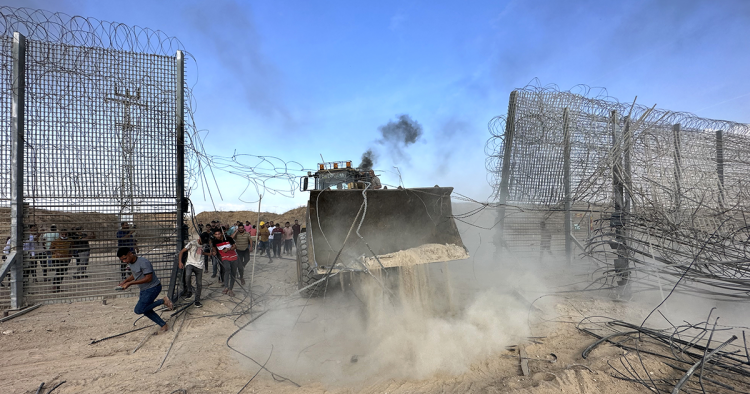Hamas' October 7 Attacks: A Bid To Sabotage Israel-Saudi Deal?

Table of Contents
The Israel-Saudi Normalization Process: A Timeline and Stakes
Israel and Saudi Arabia, despite their shared regional interests, have historically maintained a complex and often strained relationship. However, recent years have witnessed a cautious thaw in relations, driven by mutual concerns about regional security, particularly the threat posed by Iran. The potential normalization of ties represents a significant geopolitical shift.
The current status of normalization talks involves quiet diplomacy, with the United States playing a key mediating role. A successful deal promises substantial benefits for both nations:
- Economic Growth: Increased trade, investment, and technological collaborations could boost both economies significantly.
- Regional Stability: A unified front against shared threats like Iranian aggression could foster a more stable and secure Middle East.
- Strategic Alliances: Closer cooperation in intelligence sharing and military coordination could enhance the region's security architecture.
However, a successful deal also carries significant geopolitical implications:
- Iran's Response: Iran, a major regional rival of both Israel and Saudi Arabia, is likely to view a normalization deal as a significant threat to its regional influence and ambitions.
- Palestinian Issue: The deal's success hinges on addressing the Palestinian issue in a manner that does not exacerbate existing tensions.
- Regional Dynamics: The power balance in the Middle East could significantly shift, impacting existing alliances and rivalries.
Key Milestones in the Israel-Saudi Dialogue:
- Early tentative contacts under the Trump administration.
- Increased engagement under the Biden administration, focusing on mutual security concerns.
- Recent high-level meetings between officials from both countries.
Hamas' Motives: Beyond the Immediate Objectives
While Hamas publicly framed the October 7th attacks as a response to Israeli policies and actions in the West Bank and Gaza, a deeper analysis reveals the possibility of broader strategic motives. Their stated goals include the liberation of Palestine and the dismantling of the Israeli state. However, the timing of the attacks, coinciding with heightened Israel-Saudi normalization efforts, raises questions.
Could the attacks be a calculated move to derail these efforts? Analyzing Hamas' strategic objectives suggests several possibilities:
- Distraction: The sheer scale of the attacks could serve as a major distraction, diverting attention and resources from the delicate Israel-Saudi negotiations.
- Undermining Confidence: The attacks aim to severely damage the fragile trust and cooperation developing between Israel and Saudi Arabia, potentially halting or significantly delaying the peace process.
- Reassertion of Influence: The attacks could be seen as an attempt to reassert Hamas's influence and relevance in the region, countering the potential marginalization that a successful Israel-Saudi deal might bring.
Analysis of Hamas' Strategic Considerations:
- Hamas' public statements regarding the attacks have focused on the Palestinian cause.
- Hamas maintains close ties with Iran, a staunch opponent of Israel-Saudi normalization.
- Hamas aims to portray itself as the leading force in the resistance against Israel.
Evidence Suggesting a Connection (or Lack Thereof)
Establishing a direct causal link between Hamas' October 7th attacks and the Israel-Saudi negotiations requires careful examination of the evidence. The timing of the attacks, occurring amidst increased momentum in the normalization talks, is certainly suggestive, although not conclusive.
Potential Evidence of a Connection:
- Intelligence reports (if any are publicly available) that suggest prior knowledge or coordination.
- Analysis of Hamas' communications and statements leading up to the attacks.
Counterarguments:
- It is possible that the attacks were planned independently of the ongoing Israel-Saudi talks, driven solely by Hamas' internal strategic goals.
- Focusing solely on a possible connection risks downplaying the underlying grievances that fuelled the attacks.
Unintended Consequences:
- The attacks likely dealt a significant blow to the normalization process, creating mistrust and uncertainty.
- The international community's response might inadvertently hinder future diplomatic efforts.
Timeline Comparison:
- A detailed timeline comparing key events in the peace process with the planning and execution of the attacks could potentially reveal patterns or correlations.
The Impact of the Attacks on the Israel-Saudi Deal
The immediate impact of the Hamas attacks on the ongoing Israel-Saudi negotiations has been severe. Trust has been eroded, and the political will to engage in further negotiations may have diminished.
Short-term consequences:
- A temporary suspension or slowdown in normalization talks.
- Increased security concerns and a more cautious approach to diplomacy.
Long-term consequences:
- Potential for a complete breakdown of the normalization process.
- Renewed tensions in the region, hindering long-term stability and cooperation.
Reactions of regional and international actors:
- Strong condemnation of the attacks from most countries, including some Arab nations supportive of Israel-Saudi normalization.
- Increased pressure on Hamas and its sponsors.
- A potential shift in the international community's approach to mediating the Israeli-Palestinian conflict.
Hamas' October 7 Attacks and the Future of Israel-Saudi Relations
The potential link between Hamas' October 7 Attacks and the Israel-Saudi normalization process remains a complex and debated issue. While direct evidence is scarce, the timing and the potential for strategic disruption are undeniable factors warranting consideration. The attacks undoubtedly cast a long shadow on the already fragile peace process. The events highlight the intricate web of alliances and rivalries in the Middle East and the immense challenges to achieving lasting peace. The long-term implications for regional stability remain to be seen.
Call to action: Continue following developments related to Hamas' October 7 Attacks and their potential impact on the fragile Israel-Saudi peace process. Engage in further research, informed discussions, and share this article to spread awareness of the complexities surrounding these events and their potential ramifications. Understanding the nuances of this situation is critical for navigating the future of the Middle East.

Featured Posts
-
 Fortnites Return To Us App Store Hinges On Judges Decision In Epic Games Lawsuit
May 19, 2025
Fortnites Return To Us App Store Hinges On Judges Decision In Epic Games Lawsuit
May 19, 2025 -
 Johnny Mathis Announces Retirement From Live Performances
May 19, 2025
Johnny Mathis Announces Retirement From Live Performances
May 19, 2025 -
 I Istoria Kai I Simasia Ton Onomastirion Toy Agioy Ierosolymon T Heofiloy
May 19, 2025
I Istoria Kai I Simasia Ton Onomastirion Toy Agioy Ierosolymon T Heofiloy
May 19, 2025 -
 Morales Quick Ko At Ufc Vegas 106 Professional Fighters React
May 19, 2025
Morales Quick Ko At Ufc Vegas 106 Professional Fighters React
May 19, 2025 -
 London Parks Mark Rylances Concerns Over Music Festival Impacts
May 19, 2025
London Parks Mark Rylances Concerns Over Music Festival Impacts
May 19, 2025
